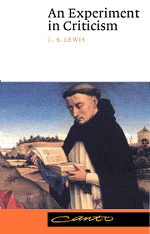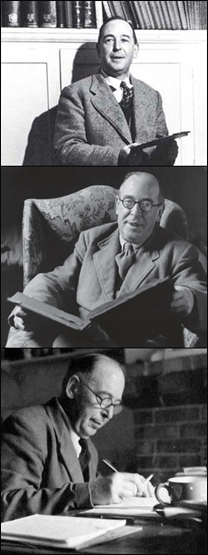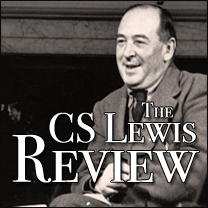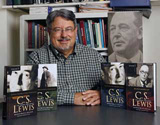
C. S. Lewis’s Great Experiment
February 24th, 2008 | Skip to comments
 A book few readers of C. S. Lewis will ever voluntarily pick up has the unwieldy, even forbidding title, An Experiment in Criticism.
A book few readers of C. S. Lewis will ever voluntarily pick up has the unwieldy, even forbidding title, An Experiment in Criticism.
The title conceals more than it reveals. An experiment in what? And criticism of whom? The title doesn’t tell. It’s the classic book that you need to know what it’s about before you know that you’d want to read it. But you won’t know that unless a friend shoves it in your hand and won’t let you shove it back. In a nutshell, it’s a theology of reading. And I once wrote a whole dissertation on it at the University of Texas.
But if I want you to investigate it, I’m going to have to do more than praise it. I’ve got to give you some incentive for tracking it down and digesting its wisdom. So first, here are three reasons to give it a try:
- it will make you a better, more reslient, more appreciative reader;
- it will explain as never before why untruths can be beautifully expressed and entrancing while lethal to be embraced, yet whole truths and nothing but the truths can be unrelentingly boring while making you wish someone more dashing could enact them;
- it will give you firm ground for explaining why some myths and fantasies often provide a greater sense of realism and dispense more profound impact upon your soul than many so-called realistic works that pride themselves on fact and empirical verifiability. So here goes my summary.
C. S. Lewis’ An Experiment in Criticism offers a kind of Summa of his mature critical views about the role of the devoted reader, a masterful account of a lifetime of readership, Lewis’s own. Who would not want to read as evocatively and passionately as he? The book is nothing less than an impassioned defense of how the reader must be an active participant in “meaning-making”—or reading is nothing but self-fulfilling prophecy.The “experiment” signified in Lewis’ title consists of reversing the normal procedures of evaluative criticism—criticism whose main purpose is to judge the “quality” of works by their compliance with a series of age-bound abstractions ordained by professional critics. Instead of judging readers’ literary taste by the things they read, Lewis objects, why should we not instead judge literature by the way they read it. In other words, let us define what constitutes “good reading” rather than what criteria make for “good books.”
Lewis thus begins his experiment with a clever depiction of two kinds of readers: the “Literary” and the “Unliterary,” the “Few” and the “Many.” The literary, because they are schooled in literary technique and appreciative of aesthetic achievement, reread “the great works” throughout their lives, feel impoverished when denied the “leisure and silence” which sanctifies their reading experience, find first readings so momentous they can only be compared to love, religion, or bereavement, and talk to each other about books “often and at length.”
The unliterary, by contrast, rarely reread a work, use reading only for “odd moments of enforced solitude” or pure diversion, finish a work without perceptible change to their worldview, and rarely think or talk about their reading with others. Identifying himself with the Literary, Lewis concludes: “We treat as a main ingredient in our well-being something which to them is marginal.” Lewis’ aim is to inspire a legion of impassioned and informed readers, yet not at the cost of valorizing the “literary,” who in their sophistication and inordinate concern for “taste” can surreptitiously grant literature a cultic status that displaces true piety.
Indeed some critics, whom Lewis labels “the Vigilants,” have tried single-handedly to fulfill the prophecy of Victorian critic, Matthew Arnold, that “poetry would replace religion” in the popular mind. The literary, Lewis points out, tend to “confuse art with life,” something the unliterary rarely do, and thereby make of literature a solemn creed that will reinforce a “tragic ‘view’ or ‘sense’ or ‘philosophy’ of life.”
Having described what one might call the motives of reading, Lewis then articulates a tool for distinguishing “good” reading from “bad”:
“A work of (whatever) art can be either ‘received’ or ‘used.’ When we ‘receive’ it we exert our senses and imagination and various others according to a pattern invented by the artist.”
“Receptive reading” invites in the reader the reflective awareness of difference, of something new, challenging, or ineffable and thus the possibility of change or “enlargement of being.”
By contrast, readers who “use” a text treat it as an appliance to reinforce their pre-existing set of values or to push them along in familiar and established ways of thinking and behaving. This latter experience is thus a closed and privatizing one—the product of what Lewis earlier in the work calls “egoistic castle-building.” While works of art may invite both “use” and “reception,” Lewis ultimately concludes that a work whose readers only use and never receive it may be judged inconsequential, or worse.
An otherwise complex work featuring pockets of eroticism may be read spuriously by adolescent readers only for its pornographic effects—“users” who pursue their prurient interests by finding the proverbial “good parts; but such a work that produced only such readings, and that from a variety or majority of readers, absent other redeeming features, is clearly a forgettable and inferior work.
The converse is also true: a despised or neglected work may yet entice a handful of loyal and dedicated readers “who had read and reread it, who would notice, and object, if a single word were changed,” and whose reading had represented to them a “lifelong delight”; such a work, Lewis argues, deserves reconsideration, and begrudging respect: “We must, therefore, say that what damns a book is not the existence of bad readings but the absence of good ones.”
It is Lewis’ point that both literary and unliterary readers may be “users” rather than “receivers” of art, and that, in fact, literary readers can be the worst offenders. The latter may inculcate in their comrades and pupils a process of reading that devalues primary experience of a work and elevates a stylized “critical reading” that demands evaluation of the work before it is fully “received.” For Lewis, the “necessary condition of all good reading is ‘to get ourselves out of the way,’” and thus to encounter fully what an author has provided, untethered to the motive of evaluation.
The works of great writers—Lewis mentions Austen and Trollope—resist “use” and demand “reception,” and thus stand the test of time. By contrast, modern critics have succeeded not only in discouraging “primary experience” in readers, inadvertently they have inspired a new brand of poetry that “involves the unmaking of your mind, the abandonment of all the logical and narrative connections which you use in reading prose of in conversation.”
In short, modern readers are doubly disadvantaged by such critics who, on the one hand, condition readers to become mere “users” of texts, and, on the other, create a market for literature that demands such “use.” Lewis has in mind here modernist poetry and fiction that exalt obscurity and ambiguity, solicit idiosyncratic or pluralistic readings, and deliberately frustrate the “common” reader’s quest for accessible meaning.
The last two chapters offer Lewis’ grand climax and resolution of the “experiment.” First, Lewis challenges the then popular slogan, “poems should not mean but be,” a rallying cry of the formalist critics he opposed who posited that true literature is non-propositional and exists as art and has meaning as art only in its “form.” Not so, Lewis counters, for a literary work both means and is: it is both “Logos” (something said) and “Poiema” (something made).
The pleasure of an aesthetic experience cannot be reduced to its form or Poiema, and the content of a text or Logos cannot be divorced from its experienced beauty. Readers respond to both, and both are crucial to primary experience of a text. A mark of the receptive reading Lewis is at pains to articulate is that “we need not believe or approve the Logos” of a text in order to enjoy it. Likewise, we may find compelling the message of or deeper myth behind a text whose form is significantly flawed or negligible.
I may agree with a sermon I despise for its rhetorically poor sentence structure and trite imagery; I may find myself enthralled by a morally suspect narrator relating a story with great panache, color, and vibrancy. I must always guard my heart!
In the end good reading actualizes what is typically only a potential aesthetic experience: the reader is enabled to inhabit another’s selfhood in a foreign landscape, yet remaining oneself—a marriage of vicarious experience and objective reflection on that experience:
The man who is contented to be only himself, and therefore less a self, is in prison. My own eyes are not enough for me, I will see through the eyes of others. Reality, even seen through the eyes of many is not enough. I will see what others have invented. Even the eyes of all humanity are not enough. I regret that the brutes cannot write books. Very gladly would I learn what face things present to a mouse or a bee; more gladly still would I perceive the olfactory world charged with all the information and emotion it carries for a dog. (140)
An Experiment is at once a winsome apology for Lewis’ own reading habits and preferences, and a cogent critique of all forms of critical snobbery that rob readers of literary pleasure in the dubious name of “Good Taste.” If we only learned the lesson that reception (voluntary incarnation in a text) is superior to use (remaining resolutely aloof from the text demanding it do our bidding), we would all become better teachers–and students, good listeners as well as good producers of text and speech.
(For why should my companion choose to enter the world to which I bid her if I have made it so errantly easy to stay outside of it by portraying exactly what she wants to see and hear and expects to see and hear, instead of offering that which will intrigue, delight, modify, and challenge those watchful dragons?)
Those well-versed in Lewis’s works (e.g., “Meditation in a Toolshed”) will recognize here the principles of “looking along” and “looking at” being juxtaposed once again. You can no longer consider Lewis’s works the same way once you have internalized these “strategies and tactics,” for they are very same ones he has adopted from the company of the Master Teacher Himself.




Comments
No comments yet.
RSS feed for comments on this post.
Sorry, the comment form is closed at this time.